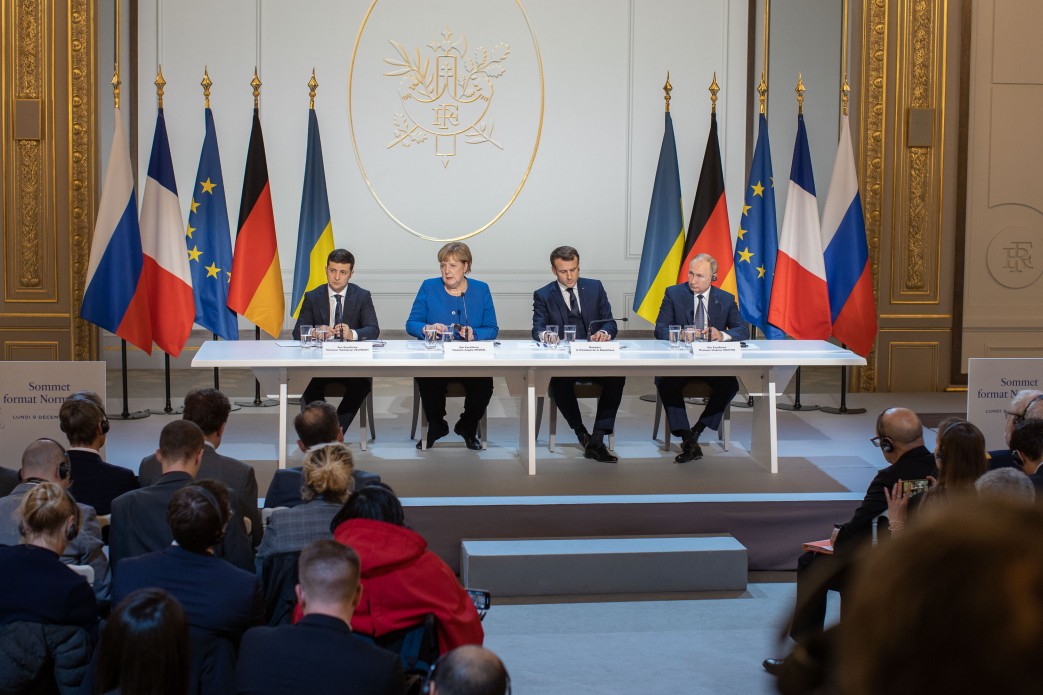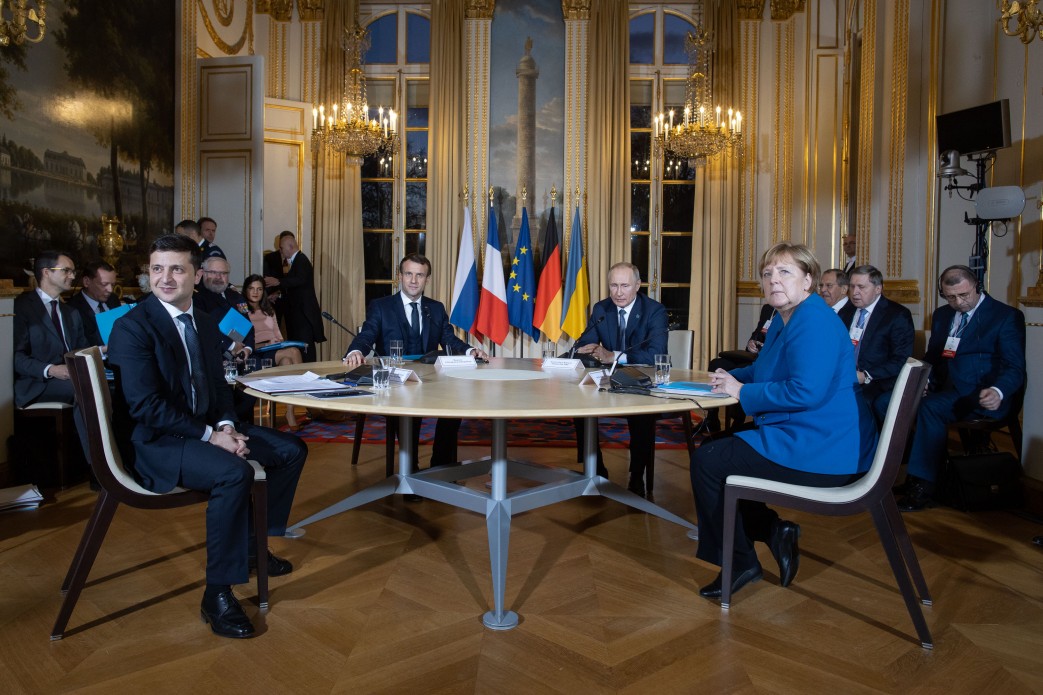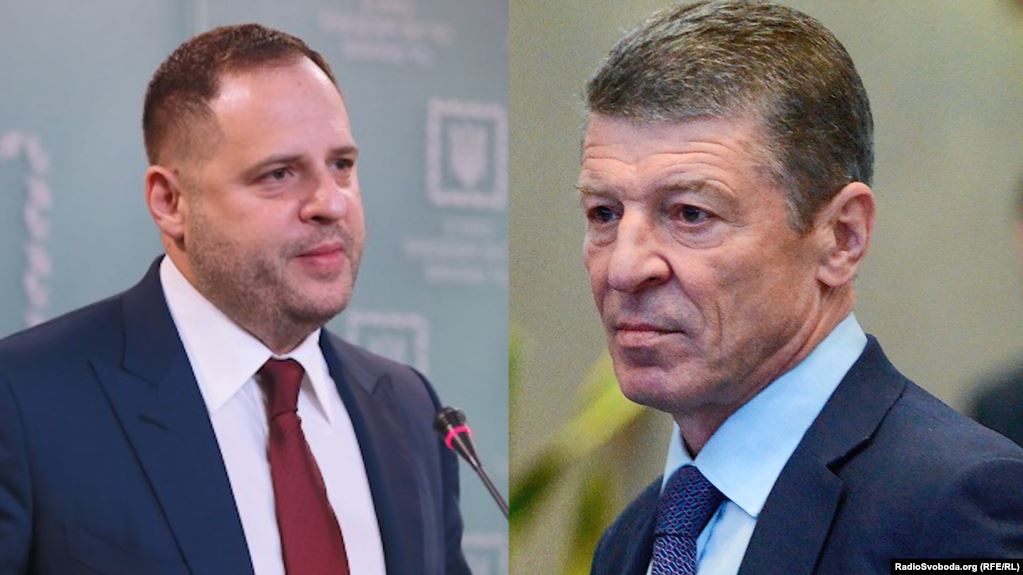The leaders of Ukraine, Russia, France, and Germany participating in the Normandy summit said the Minsk process to solve the conflict in Donbas had been revived. Some observers are cautiously optimistic about the prospects for peace. But a closer look at the outcome of the meeting reveals that Russia's goals had not changed - and because of that, the end of the war is still a distant hope.
- a recognition that the Minsk agreements (Minsk Protocol of 5 September 2014, Minsk Memorandum of 19 September 2014 and the Minsk Package of Measures of 12 February 2015) are the basis of the work of the Normandy group;
- a plan to establish a ceasefire by the end of 2019 and a mine clearance plan, new crossing points between the occupied Donbas and free Ukraine, three more disengagement zones in addition to the ones in Petrivske, Stanytsia Luhanska, and Zolote;
- an agreement to exchange prisoners by the end of the year, starting with "all identified for all identified" and granting international organizations, including the International Committee of the Red Cross (ICRC), full and unconditional access to all detained persons;
- the sides "expressed interest" in agreeing on all the legal aspects of the so-called "special status" of occupied Donbas (otherwise called Separate Regions of the Donetsk and Luhansk Oblasts, or ORDLO in Ukrainian) "in order to ensure its functioning on a permanent basis";
- a decision to incorporate the "Steinmeier formula" into the Ukrainian legislation.
While there is nothing new about #1 and #2 - the Minsk process is still being regarded as the only solution to the war in Donbas, there have been many ceasefires staring from the first Minsk protocol in September 2014 and all have failed; new crossing points in addition to the six existing ones will make life easier for the civilians living in occupied Donbas; disengagement zones, meaning zones of a total troop withdrawal, are a project running back to 2016, the implementation of which Putin made a condition for the Normandy meeting. #3 can be welcomed - the last prisoner swap in Donbas took place two years ago. However, #4 and #5 are new developments potentially detrimental to Ukraine, which we will discuss further.
Zelenskyy names Ukraine's red lines; Putin names Russia's goals

- No federalization for Ukraine;
- No external influence on the course of Ukraine's development - i.e. no rejection of the EU-NATO course;
- No deals to "exchange" occupied Crimea for peace in Donbas - Ukraine's territorial integrity is inviolable.
- Read also: Ukrainians rallying in Kyiv to warn Zelenskyy not to cross red lines at talks with Putin
- Ukrainian and Russian positions at Normandy Four talks in Paris
- Putin stressed that the document adopted at the meeting confirmed there is no alternative to a "rigorous and consistent" implementation of Minsk-2 (in fact, it did not);
- As well, he stated that de-escalation measures such as the disengagement of troops have to be synchronized with the political measures of Minsk-2 - namely, Ukraine permanently enshrining a "special status" for occupied Donbas in its Constitution and making its temporary law on the "special status" of Donbas permanent.
- Also, he noted that the sides had reached an agreement on incorporating the "Steinmeier Formula" into Ukrainian law. This controversial formula outlines that the law on the "special status" of Donbas will come into permanent force after the OSCE will determine the local elections in occupied Donbas to have been held in accordance with democratic standards. However, it says nothing about when the elections will be held - before or after Ukraine gains control over the border, whether there will be a transitional period, etc.
The text of Minsk-2, which Ukraine signed in 2015 amid a Russian military offensive and Putin's blackmail of European leaders with a full-fledged war, enshrines these Russian positions. A "rigorous and consistent" implementation of this protocol would equal Ukraine's capitulation. Local elections in the occupied territories while they are still occupied, and without a transitional period, will result in the election of Russia's puppet "leaders" of the republics, who Kyiv will be forced to deal with as legitimate representatives of the puppet regions. And a permanent status for the zone of chaos Russia has engineered is exactly what Russia wants: it will allow to permanently legalize its proxy "republics" in the Ukrainian legal system with Ukraine footing the bill, and foster Ukraine's internal instability through them. Ultimately, this would hinder the country's movement towards the EU and NATO.
A flexible Minsk?

How this happened is examined in detail in the Euromaidan Press report "Leaked Kremlin emails show Minsk protocol designed as path to Ukraine’s capitulation." In short, initiatives for rapid conflict resolution such as de-occupation of state buildings, resumption of Ukrainian broadcasting in the occupied region, and joint patrolling of the occupied territory were tossed out the window after Ukraine signed Minsk-1 in September 2014 amid a Russian invasion and massacre of Ukrainian troops at the battle for Ilovaisk. A new position was added - a temporary law on the "special status" of occupied Donbas. But, importantly, Minsk-1 still contains Poroshenko's initial proposal to, first of all, establish a buffer zone on the Ukrainian-Russian border. This proposal pinpointed the main reason for the war in Donbas - Russian troops and weapons seeping into eastern Ukraine. However, the Russian-led militants in Donbas did not stop shooting and Russia did not stop invading; moreover, there are accounts of Vladimir Putin threatening EU leaders with a full-blown war if his demands were not met. The Minsk-2 protocol was signed amid this military pressure on Ukraine and moral pressure on EU leaders. The buffer zone on the Ukrainian-Russian border was replaced by a buffer zone on the contact line between free Ukraine and occupied Donbas. The temporary law on the "special status" of occupied Donbas in Minsk-1 became permanent and Donbas was also to get a mention in the Ukrainian Constitution. Local elections were to be held before Russian troops are withdrawn and before Ukraine gained control of its territory. There is, therefore, little wonder that Putin insists on a "rigorous and consistent" implementation of Minsk-2. During the presidency of Petro Poroshenko, Ukraine managed to avoid this "rigorous" implementation: the projected law to change the Ukrainian Constitution contained only a fleeting reference to occupied Donbas, stating that their regime was defined by a separate "special status" law; and this "special status law" was temporary, with its prolongation depending on a vote in parliament. Perhaps it is because of Poroshenko's unwillingness to be "rigorous and consistent" in Ukraine's concessions to Russia that the Minsk process entered a stalemate. Zelenskyy's proposal to change the text of Minsk-2 to make it less detrimental to Ukraine's state interests is, therefore, an important development that can potentially make Minsk a workable solution for the conflict in Donbas. However, it is unlikely that Russia will accept such changes as they will go against its goals of politically subverting Ukraine. That a permanent status for its zone of chaos in Donbas will be Russia's pressure point for Ukraine in the near future was apparent from the outcome of the Normandy meeting. Its final communique states the sides "expressed interest" in ensuring that Ukraine's temporary "special status" law becomes permanent. However, the English version of the communique on the site of the Ukrainian president is different. The words "in order to ensure its functioning on a permanent basis," are replaced by "to ensure its continued operation," suggesting that this point of the communique was argued over. Evidence for this is provided by Aleksei Chesnakov, director of the Center for current policy and, as the Surkov Leaks revealed, one of the crucial analysts helping Surkov with waging hybrid war against Ukraine. Chesnakov, who was present at the Normandy meeting along with other Kremlin officials, helpfully informed in a facebook post that the reason for Surkov's reported anger during the negotiations in Paris was Ukraine's insistence to remove to point with the "permanent basis" for the law from the final version of the communique. Chesnakov boasted that Russia had forced Ukraine to keep the "permanent basis" point by threatening to withdraw from the negotiations.Minsk-2 is the result of Russia's hijacking of Poroshenko's initial peace plan - a document with the potential of quickly ending the conflict in Donbas - with the help of invasions, massacres, and blackmail of EU leaders. Moreover, contrary to all logic, Minsk-2, which is supposed to be a "package of measures to implement Minsk-1," contradicts this initial document.
A permanent "special status" for occupied Donbas would be dangerously close to crossing a "red line" for Ukraine - namely, federalization. Therefore, Zelenskyy's initiative to change the text of Minsk-2 should include not only holding local elections after Ukraine gains control over the border, but the rejection of any permanent status for the occupied zone. Essentially, this will be going back to the logic of Minsk-1.
The bottom line
The Normandy meeting outcomes can be seen as mildly pro-Russian. Russia had signed no obligation to remove its troops from Ukrainian territory or implement any other security measures. Although there is a requirement of a ceasefire, Russia is under no obligation to enforce it; like before, it can say that the "separatists" of Donbas have their own mind regarding ceasefires. On the other hand, Ukraine is one step closer to a permanent status for Russia's proxy "republics." Russia is still positioned as a peacemaker instead of a party to the conflict. The goals of the Ukraine and Russia in the Minsk process remain fundamentally different. Ukraine wants to resolve the conflict and reintegrate Donbas; Russia wants to make the conflict permanent, and thus insists on a verbatim implementation of Minsk-2, which will enable this outcome. There is no solution to this conflict of goals, and that is why we should not have high expectations for the Minsk process ending the war anytime soon, if at all. Nevertheless, short-term achievements such as the prisoner swap carry relief for the direct victims of war and are, without doubt, a positive development - if they come with no strings attached.Read more:
- The real problem with “Steinmeier’s formula” and the Russo-Ukrainian war
- Can Zelenskyy “stop the war in Donbas” and how will the Steinmeier formula affect Ukraine? An FAQ
- Protests against Steinmeier’s formula spread in Ukraine, “movement against capitulation” founded
- Protests against “Steinmeier’s formula” gather largest crowd since Euromaidan




